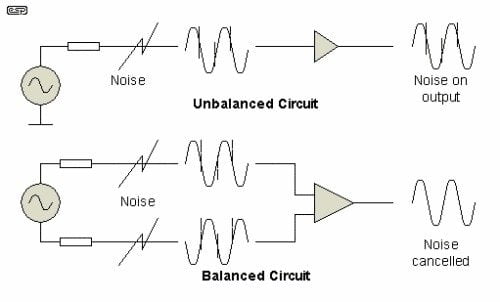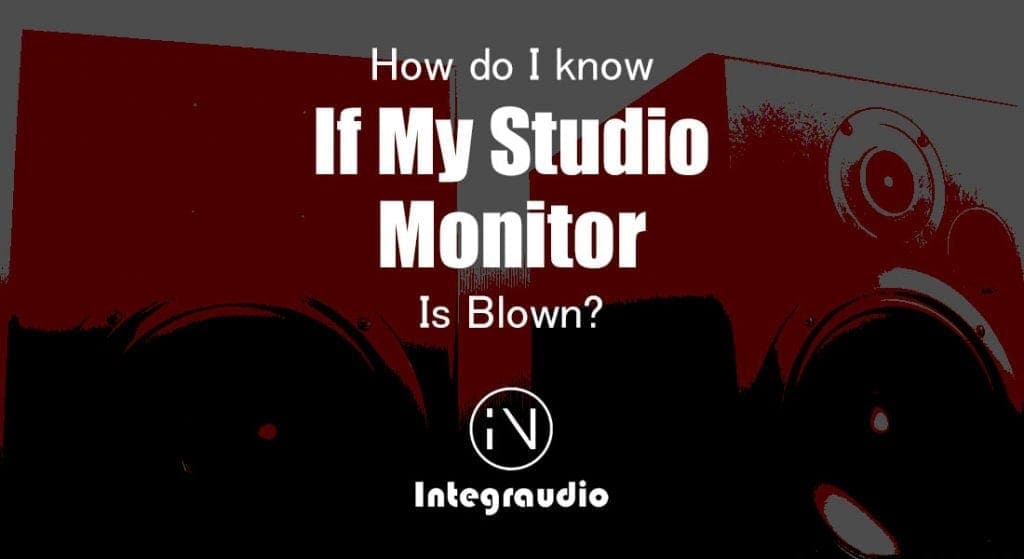High volumes for long periods, overheating, driver malfunctions, and miss-treating your speakers will all cause your speakers to become blown.
You may be hearing rattling, or from a tweeter, you may hear a humming/buzzing sound – well, this would be a good indication that your speakers are damaged.
How Do I Damage A Studio Monitor?
Damaging speakers can be caused by several different scenarios such as; having them turn up too loud for too long, overheating parts, pushing on the cones with force at any time, plugging in an AUX when the speakers are at full volume and many more reasons that can cause damage.
Your speakers work by converting electrical energy into mechanical energy.
Listen out for humming/buzzing from the tweeters – from the sub; you will typically hear flapping/rumbling sounds. These are strong indications your speakers are blown.
When producing on my equipment, you should always use limiters to keep the volume below -0.0dB, thus never allowing your speakers to process sounds above a set level.
High-end studio monitors have very delicate components; these components are not built to deal with harsh and deafening sounds. Referring to the user manual for safety tips is and volume limits are always advised.
Remember, always use protection.
Related Readings:
Top 12 NearField Studio Monitors On Any Budget
Best Available Far-Field Studio Monitors (Biggest Monitors)
FarField, MidField & NearField Monitors – Their Uses, Pros & Cons
Do You Need Music Amplifier For Studio Monitors or Studio Headphones?
What Are The Advantages Of Passive Radiator Design?
Can Underrun Pops Damage The Studio Monitors?
Ever dragged in a sample to chop, but it has awful pops and clicks when the sample begins and ends?
These are common ways producers blow speakers. These clicks and pops should be running into volume limiters or manually turning down your monitors when removing or presuming there will be clicks and pops; they are very loud audio signals sent through your drivers, causing instant fatal damage to your beloved setup.
Another way these can occur is when turning on/off your setup. With your interface firing huge voltages to your speakers, you should always make sure to turn your audio interface on first when loading up your configuration; and then be the last thing turned off at the end of your session.
Why Do My Studio Monitors Buzz?
If you are using one main outlet for your monitors, computer, and interface, you will have what is called a ‘Ground Loop.’ To fix this issue, you will have to re-route your plugs to have independent energy outlets, giving them their full energy potential causing no humming.

Credit: RSP Supply
In the event, you tried this, and you still have a buzzing sound coming from your speakers. This could be caused by poor cable connection, be sure to check each input and output cable making sure they work to the level intended.
The final thing to check for is any frequency interference, such as having your phone next to the speakers or anything similar that can emit signals that will interrupt the inner components within the speaker.
You may also have old drivers installed on your computer – check that you have the latest versions of these drivers and try again.
Why do I hear Noise/Humming In My Studio Monitors?
Using RCA cables (unbalanced) is not the only type of wires that can cause these issues but mainly using RCA cables will cause electrical noise. Using balanced XLR/TRS/stereo cables will eliminate many noise issues; they have a third ring that balances out the electrical noise by sending positive and negative to cancel out the sound.
Because unbalanced is so susceptible to noise, they can be affected by other cables running near them, which is very common in most cases for studio setups.

Credit: Major HiFi
When using heavy compression, you may also experience this as it will bring up the noise floor of samples/recordings/devices.
Always make sure to buy the correct audio cables for your setup; otherwise, you may suffer from noise issues or pops and clicks, which can cause serious harm to your speakers.
How To Fix Audio Crackling In Studio Monitors?
The number one way to eliminate crackling is to use a balanced connection to eliminate most issues.
Failing that, maybe you have a ground loop causing the full energy capabilities of the speakers to be obtained. Try switching your plugs to new power outlets; isolating a single speaker can eliminate many noise issues.
Be sure to check what buffer size you are producing in your DAW audio settings. This will impact performance and, in most cases, cause digital distortion to occur.
Over amplifying your sounds may also cause this, be sure to have limiters set on master channels and turn up speakers to a comfortable volume while testing and creating sounds.
How Do I Fix My Studio Monitors?
Dust caps that have been pushed inwards create some nasty noises and can cause damage to the drivers behind. Here is a helpful video on how to fix this issue.
A way to fix your speakers if they have no power is to change the plugin the fuse; you will need to make sure the new fuse is the same as the old when replacing.
And if these don’t work, we would advise heading over to google and looking at local repair shops that are well-reviewed. They will know what they are talking about and can help you with any monitor issues.
How Can I Avoid Breaking My Monitors?
- One of the best ways to avoid breaking your monitors is always to keep an eye on the level going into them and find a comfortable level for your ears and the monitors.
- Always be sure to use limiters/soft clip audio when you are working in any DAW; this will avoid hash peaks and cut of noises above the set level.
- Keep good care of your dust covers and make sure not to press them in.
- Use the correct cables.
- Always make sure to turn on/off your setup in the correct order.
Ultimately If you take good care of your monitors and care for them, they will last you a very long time. Speakers and studio monitors are not toys and take a high level of skill to engineer, causing them to be susceptible to breaking easily.
Other Studio Monitor Topics:
Can You Use Studio Monitors as Regular Speakers?
Best NearField Monitors: 12 Picks For More Clarity
Top 10 Studio Monitors For Untreated Room
Are Studio Monitors Worth It In The Untreated Room? – 7 Tips
Top 10 Studio Monitor Brands In The World
Best Midfield Monitors: 10 Picks For Your Studio
Best Biggest Studio Monitors (FarField Monitors)
FarField, MidField & NearField Monitors – Their Uses, Pros & Cons

Tyler Connaghan is a producer, composer, and engineer based in Los Angeles, CA. He studied music for two years at the University of Southern California before landing a job at Killingsworth Recording Company, where he currently produces music for television and film.

